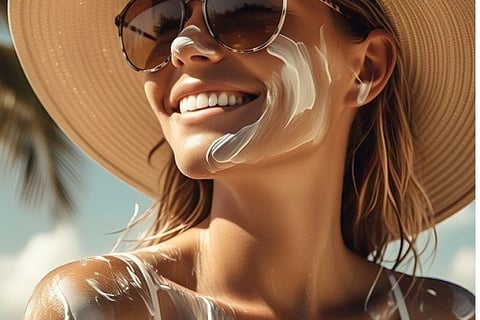A trusted medical information hub.
Sunscreen : Benefits, Myths, and Best SPF Tips
Sunscreen all you need to know how it works, the differences between SPF levels, common misconceptions, and how to choose the best formula for your skin type.
WELLNESS
3/17/20257 min read


Picture this: It’s a scorching summer day, and you’re lounging at the beach, the sun beating down on your skin. You’re slathered in sunscreen, feeling confident that you’re protected from those harsh UV rays.
But then, a friend casually mentions they skipped sunscreen because “it’s too greasy” or “I don’t burn easily.” Fast forward a few hours, and they’re red as a lobster, wincing with every move. Sound familiar?
This all too common scenario underscores a critical truth: sunscreen isn’t just a luxury—it’s a necessity. With skin cancer rates on the rise and UV damage contributing to premature aging, understanding how to choose and use sunscreen effectively is more important than ever.
In this guide, we’ll dive into the science behind sunscreen, debunk common myths, and share expert tips to help you find the best sunscreen for your skin type.
Whether you’re searching for “best sunscreen for sensitive skin,” “how to apply sunscreen properly,” or “sunscreen benefits for antiaging,” we’ve got you covered.
Let’s explore why sunscreen is your skin’s ultimate protector and how to make it a nonnegotiable part of your daily routine.
Why Is Sunscreen Important?
Sunscreen is far more than a seasonal accessory—it’s a critical tool for protecting your skin and overall health. Its importance stems from its ability to shield you from the sun’s ultraviolet (UV) rays, which can cause a range of shortterm and longterm damage.
From preventing painful sunburns to reducing the risk of skin cancer and slowing premature aging, sunscreen is a scientifically backed necessity. Let’s break down the key reasons why sunscreen is essential, supported by data and expert insights.
1. Protection Against Skin Cancer
The most compelling reason to wear sunscreen is its role in preventing skin cancer, the most common cancer in the United States. UV radiation from the sun is a primary cause of skin cancers, including melanoma, basal cell carcinoma, and squamous cell carcinoma.
Data: According to the Skin Cancer Foundation, more than 5 million cases of skin cancer are diagnosed annually in the U.S. alone. The American Cancer Society estimates that in 2025, approximately 100,640 new cases of melanoma (the deadliest form of skin cancer) will be diagnosed, with around 8,290 deaths.
UV Link: The World Health Organization (WHO) states that up to 90% of nonmelanoma skin cancers and 86% of melanomas are associated with UV radiation exposure from the sun.
Sunscreen’s Impact: A 2011 Australian study published in the Journal of Clinical Oncology found that regular sunscreen use reduced the incidence of melanoma by 5073% in adults. Another study in the Annals of Internal Medicine (2016) showed that consistent sunscreen use could prevent 231,000 cases of melanoma annually in the U.S. if universally adopted.
By applying broadspectrum sunscreen (which protects against both UVA and UVB rays), you significantly lower your risk of developing skin cancer, making it a proactive step in cancer prevention.
2. Prevention of Sunburn and Immediate Skin Damage
Sunburn is the most immediate and visible consequence of UV exposure. It occurs when UVB rays penetrate the skin, causing inflammation and damage to the outer layers. Beyond the discomfort, repeated sunburns increase the risk of longterm skin damage and cancer.
Data: The Centers for Disease Control and Prevention (CDC) reports that over onethird of U.S. adults experience at least one sunburn each year, despite widespread awareness of UV risks.
Sunscreen Efficacy: A 2018 study in JAMA Dermatology found that applying SPF 30 sunscreen reduced the incidence of sunburn by 40% compared to no protection, even under intense sun exposure.
Broader Impact: Sunburn doesn’t just hurt—it damages DNA in skin cells, accelerating the risk of mutations that can lead to cancer over time.
Sunscreen acts as a barrier, absorbing or reflecting UV rays before they can harm your skin, preventing both immediate pain and longterm consequences.
3. Slowing Premature Aging (Photoaging)
UVA rays, which penetrate deeper into the skin, are the primary culprits behind photoaging—premature aging caused by sun exposure. This includes wrinkles, fine lines, age spots, and loss of skin elasticity. Sunscreen helps maintain youthful skin by blocking these rays.
Data: A 2013 study published in the Annals of Internal Medicine followed 900 participants over four years and found that those who used sunscreen daily had 24% less skin aging (measured by wrinkles and skin texture) than those who didn’t.
UV Contribution: Dermatologists estimate that up to 90% of visible skin aging is due to sun exposure, according to the American Academy of Dermatology (AAD).
Consumer Insight: A 2022 survey by the AAD revealed that 70% of respondents were unaware that UVA rays, which pass through glass and clouds, contribute to aging even on overcast days or indoors near windows.
Broadspectrum sunscreens with at least SPF 30 are recommended to combat both UVA and UVB rays, preserving your skin’s appearance and health over time.
4. Protection for All Skin Types and Tones
A common myth is that people with darker skin tones don’t need sunscreen because they don’t burn as easily. While darker skin has more melanin, which provides some natural protection, it’s not enough to fully shield against UV damage.
Data: The Skin Cancer Foundation notes that while melanoma is less common in people with darker skin, it’s often diagnosed at a later stage, leading to higher mortality rates. For example, the 5year survival rate for melanoma in Black patients is 70%, compared to 94% in White patients.
UV Damage Beyond Burns: Even without visible burns, UV exposure can cause hyperpigmentation, uneven skin tone, and longterm cellular damage in all skin types.
Sunscreen Use: A 2021 study in JAMA Dermatology found that only 31% of Hispanic and 17% of Black adults in the U.S. reported using sunscreen regularly, highlighting a need for greater education on its universal importance.
Sunscreen is essential for everyone, regardless of skin tone, to protect against cancer, aging, and other UVrelated damage.
5. Supporting Overall Public Health
Beyond individual benefits, widespread sunscreen use has broader public health implications. Reducing skin cancer rates decreases healthcare costs and improves quality of life.
Economic Impact: The CDC estimates that skin cancer treatment costs the U.S. healthcare system $8.1 billion annually. Preventive measures like sunscreen use could significantly reduce this burden.
Global Perspective: In Australia, where UV exposure is exceptionally high, a decadeslong public health campaign promoting sunscreen use has led to a decline in melanoma rates among younger populations, according to a 2020 study in The Lancet.
By incorporating sunscreen into daily routines, individuals contribute to a collective effort to combat a preventable public health issue.
How to Maximize Sunscreen’s Benefits
To reap these benefits, proper application is key:
SPF Level: Use a broadspectrum sunscreen with at least SPF 30, which blocks 97% of UVB rays. SPF 50 blocks 98%, offering slightly more protection.
Application: Apply about 1 ounce (a shot glass full) to cover the entire body, and reapply every 2 hours—or more often if swimming or sweating.
Daily Use: Wear sunscreen every day, even on cloudy days, as up to 80% of UV rays can penetrate clouds (AAD).
Sunscreen is a scientifically proven shield against skin cancer, sunburn, and premature aging, with benefits that extend to all skin types and public health at large. The data is clear: regular use can reduce melanoma risk by up to 73%, prevent 24% of visible skin aging, and save millions in healthcare costs.
By making sunscreen a daily habit, you’re not just protecting your skin—you’re investing in your longterm health and wellbeing. So, the next time you step outside (or even stay near a window), don’t skip the sunscreen—it’s a small step with monumental benefits.
FAQ About Sunscreen
1. Why is sunscreen important?
Sunscreen protects your skin from harmful UV rays, reducing the risk of sunburn, premature aging, and skin cancer. It also helps prevent hyperpigmentation and sunspots.
2. What is SPF, and what does the number mean?
SPF (Sun Protection Factor) measures how well a sunscreen protects against UVB rays. For example, SPF 30 blocks about 97% of UVB rays, while SPF 50 blocks about 98%.
3. What is the difference between UVA and UVB rays?
UVA rays penetrate deeply into the skin, causing aging and wrinkles.
UVB rays cause sunburn and contribute to skin cancer.
A broad-spectrum sunscreen protects against both.
4. How often should I apply sunscreen?
You should apply sunscreen every two hours when outdoors and immediately after swimming or sweating. Even if you are indoors, reapplying is recommended if you’re near windows or exposed to blue light.
5. Do I need sunscreen on cloudy or winter days?
Yes! Up to 80% of UV rays penetrate clouds, and snow can reflect UV rays, increasing exposure.
6. How much sunscreen should I apply?
Use about 1 ounce (a shot glass full) for your entire body and a nickel-sized amount for your face.
7. Should I wear sunscreen indoors?
Yes, especially if you are near windows or exposed to blue light from screens, which can contribute to skin damage.
8. What is the difference between chemical and physical (mineral) sunscreens?
Chemical sunscreens absorb UV rays and convert them into heat. They are lightweight and blend well.
Physical (mineral) sunscreens contain zinc oxide or titanium dioxide, which reflect UV rays. They are better for sensitive skin.
9. Can I use expired sunscreen?
No. Expired sunscreen may lose its effectiveness and not provide proper protection. Always check the expiration date.
10. Is sunscreen safe for babies?
Babies under 6 months should avoid direct sun exposure. After 6 months, use a baby-friendly, mineral-based sunscreen with SPF 30 or higher.
11. Can sunscreen cause breakouts?
Some sunscreens can clog pores. Look for non-comedogenic formulas if you have acne-prone skin.
12. Does a higher SPF mean better protection?
SPF 30 blocks 97% of UVB rays, while SPF 50 blocks 98%. Higher SPF offers slightly better protection but should still be reapplied regularly.
13. Can I use body sunscreen on my face?
It's best to use a face-specific sunscreen, as body sunscreens may be too greasy or irritating for facial skin.
14. What ingredients should I avoid in sunscreen?
Avoid oxybenzone and octinoxate, as they may cause skin irritation and harm coral reefs. Choose reef-safe sunscreens if swimming in the ocean.
15. Can dark skin tones skip sunscreen?
No. While darker skin has more melanin, it is still susceptible to sun damage, hyperpigmentation, and skin cancer.
16. Does sunscreen prevent tanning?
Sunscreen reduces tanning by blocking UV rays, but some tanning can still occur, especially with prolonged sun exposure.
17. What is water-resistant sunscreen?
Water-resistant sunscreen stays effective for 40-80 minutes in water. Always reapply after swimming or sweating.
18. Can I wear makeup over sunscreen?
Yes! Let sunscreen fully absorb before applying makeup. Some foundations contain SPF, but they aren’t enough on their own.
19. Do I need sunscreen if my foundation has SPF?
Yes, because most makeup products don’t provide enough coverage. Always use a dedicated sunscreen underneath.
20. What is the best sunscreen for sensitive skin?
Mineral sunscreens with zinc oxide or titanium dioxide are gentle and ideal for sensitive skin.
